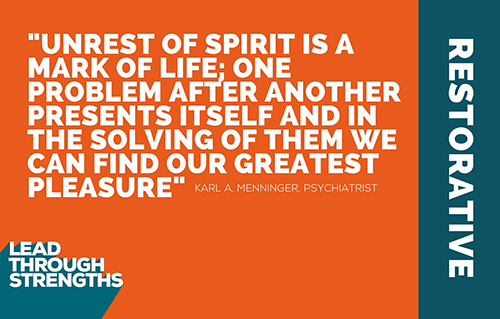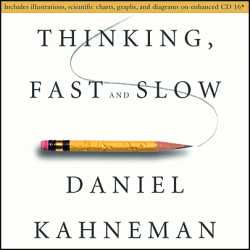People strong in the Restorative theme are adept at dealing with problems. They are good at figuring out what is wrong and resolving it.


You can tell a person strong in Restorative by these attributes (source: Dr. Hulme, APU):
- Energized by problem-solving
- Readily take on projects others see as “unsalvageable”
- Can analyze a situation and see immediately what needs to be fixed
- Quickly recognize problems others don’t see
- Love to “save the day!”
More about Restorative:
- Needs on a team: To solve problems
- As a Leader: Assess challenges
- In Conflict: Help resolve differences
- Partner with:
- In academics:
– loves to solve problems – case studies, problem solving exercises, and other class activities that allow them to come up with “solutions” will appeal to them – appreciates feedback from profs – always wants to know how something can be done better or how they can improve – may enjoy political science, sociology, or psychology
Where does Restorative Theme rank in the population?
|
9 |
|
2 |
7 |
Out of your Top 5 CliftonStrengths, it’s statistically:
- most likely to appear with Responsibility and Empathy
- least likely to be found with Maximizer or Significance
The genius of your Restorative talent is found in the way you can think and fix things. This is key to all problem solving. But your ability to fix goes beyond patching things together. The way you restore things involves bringing them back to life. Accordingly, you can have a restorative effect on relationships and in fact, entire organizations. The genius of your Restorative strength is that you are so good at figuring out what is not working, resolving that, and then guiding people to a way of being healthy and highly functional.
At your best (Balcony):
-
problem solver, troubleshooter, finds improvements and solutions
At your worst (Basement):
-
focuses on weaknesses, punitive, negative, critical
 Restorative may be one of your signature themes if…
Restorative may be one of your signature themes if…
- You love problem-solving problems, which energize you.
- Tackling challenges head-on and finding solutions gives you the utmost satisfaction.
- You enjoy pondering practical, conceptual, and/or personal problems.
- You may seek out problems that you know you can fix to lend your expertise.
- You like to “save” situations, relationships, people and things.
- You know that your particular expertise keeps the company running.
- Source: Let’s Talk Personality
A more detailed explanation from Gallup:
You love to solve problems. Whereas some are dismayed when they encounter yet another breakdown, you can be energized by it. You enjoy the challenge of analyzing the symptoms, identifying what is wrong, and finding the solution. You may prefer practical problems or conceptual ones or personal ones. You may seek out specific kinds of problems that you have met many times before and that you are confident you can fix. Or you may feel the greatest push when faced with complex and unfamiliar problems. Your exact preferences are determined by your other themes and experiences. But what is certain is that you enjoy bringing things back to life. It is a wonderful feeling to identify the undermining factor(s), eradicate them, and restore something to its true glory. Intuitively, you know that without your intervention, this thing-this machine, this technique, this person, this company-might have ceased to function. You fixed it, resuscitated it, rekindled its vitality. Phrasing it the way you might, you saved it.
Action Items for This Theme
- Seek roles in which you are paid to solve problems. You might particularly enjoy roles in medicine, consulting, computer programming, or customer service, in which your success depends on your ability to restore and resolve.
- Study your chosen subject closely to become adept at identifying what causes certain problems to recur. This sort of expertise will lead you to the solution that much faster.
In all of your relationships, do not be afraid to let others know that you enjoy fixing problems. It comes naturally to you, but many people shy away from problems. You can help. - Think through the ways you can improve your skills and knowledge. Identify the courses you can take to plug your gaps.
- Make a list of ways that you could help people who are disadvantaged, such as volunteering in your community or fund-raising.
Be ready to:
- Give yourself a break. Your strong Restorative theme might lead you to be overly self-critical. Try to redirect this theme either toward things about yourself that can be fixed, such as knowledge or skills (but not talent), or toward external, tangible problems.
- Allow other people to solve their own problems. You might want to rush in and solve things for them, but in so doing you might hinder their learning. Watch out for this, particularly if you are in a manager, coach, teacher, or parenting role.
- The Clifton StrengthsFinder and the 34 Clifton StrengthsFinder theme names are protected by copyright of Gallup Inc., 2000. All rights reserved.
For the more visually inclined:
A fantastic website with insightful discussion of Restorative, including
 Building your brand through this strengths
Building your brand through this strengths- Strengthening your performance at work
- Tips for managing someone with this strengths
- Partnering with someone with this strength

Restorat ive Power and Edge takes an interesting approach highlight not just what the strength is and how it shows up if you have it in your top five, but also how to navigate the world when this strengths is one of your lesser ones.
ive Power and Edge takes an interesting approach highlight not just what the strength is and how it shows up if you have it in your top five, but also how to navigate the world when this strengths is one of your lesser ones.
More ideas on going deeper:
- Gallup on How You Can Productively Aim Your Restorative Talents
- Many universities use the StrengthsQuest Workbook to help you build relationships, more effectively study and find meaning in what you do.
- South Mountain Community College offers up ideas on Applying your Talents in Career Discovery and Applying your Talents in Academics
- Western Texas tells us about Using your Strengths In the Job Search, Interview and New Position
- Weber State University has posted action plan worksheets for each of Gallup’s 34 strengthsfinder talents.
THEME INSIGHTS:
- I am (Belong) ———-> not intimidated by points of pain or dysfunction
- I will (Doing) ———-> look for the bug in the system, diagnose what ails
- I Bring (Contribution) ———-> courage and creativity to problematic situations
- I Need (Requirement) ———-> problems that must be solved
- I Love (Value) ———-> finding solutions
- I Hate (Value) ———-> the idea that problems will disappear if they are ignored
- Metaphor/Image ———-> medical model
- Barrier Label ———-> perceived as negative because of association with
problems
THEME CONTRAST:
- Restorative:Trouble-shooter
- Strategic: Map-maker————————————————————————————————–
- Restorative:I intentionally invade problem areas to restore the original state.
- Positivity: I intentionally evade problem areas to maintain my emotional state.
 Season 1: Loving Your Theme
Season 1: Loving Your Theme- Season 2: Theme Dynamics
- Comparing and contrasting
- Highly recommended: Utilize the Called to Coach worksheet for Restorative as you listen.
- Season 3: Strengths Based Leadership
- Season 4: Focusing on Success
- Season 5: Highlights From Your CliftonStrengths 34 Report
- Season 6: Developing Teams and Managers

The Thinker’s Toolkit: 14 Powerful Techniques for Problem Solving

Check out the Thinker’s workshop
Podcast episodes to help you understand and leverage your Restorative Strength
- Episode 1: Problem-Solving and Troubleshooting – “The Art of Charm”
- Episode 2: Innovations in Problem-Solving – “The McKinsey Podcast”
- Episode 3: Strategies for Finding Solutions – “The Tony Robbins Podcast”
- Episode 4: The Psychology of Repairing and Restoring – “The Psychology Podcast”
- Episode 5: Restorative Justice and Healing – “On Being with Krista Tippett”
- Episode 6: Women Leaders Who Excel in Problem-Solving – “The Confident Woman Podcast” (Host: Sherry Parks)
- Episode 7: The Restorative Woman: Strategies for Effective Solutions – “Women Who Lead” (Host: Andrena Sawyer)
Listen to great Strengths Podcasts
- Theme addicts is a series created by UnleashStrengths to highlight the massive impact the StrengthsFinder assessment through interviews and discussions.
- Lead through your strengths features many interesting guests and Career Q and A about leverage your strengths at work.
- Maximize Your Strengths features interviews and discussion on developing your strengths. She really drills into each of the themes by interviewing real people on how a specific theme shows up in their lives.
- Called to Coach is a webcast resource for those who want to help others discover and use their strengths. We have Gallup experts and independent strengths coaches share tactics, insights and strategies to help coaches maximize the talent of individuals, teams and organizations around the world.
- ISOGO TV promises a lot: So dramatically increase your energy and decrease your frustration at work, that you cannot help but take the Strengths paradigm home to your family. Fueling life-changing stories.
- The True Strength Podcast by Ian Pettigrew (Kingfisher Coaching) features inspiring true stories of how people succeed through applying their strengths and being resilient. It often includes a Gallup StrengthsFinder profile.
- If you are looking to identify and develop your strengths and talents, take calculated risks and make decisions, The Strengths Revolution with Steve Morgan will help your personal development, as well as helping you support your clients, employees, teams and wider organisations. Knowing your strengths will also support positive risk-taking and decision making as part of good risk management.
View this post on Instagram
Sources:
- Balconies and Basements
- Leadership, team and conflict
- The Genius and Beauty of Strengths
- Strengths-based academic Advising
- Strengths partnerships





